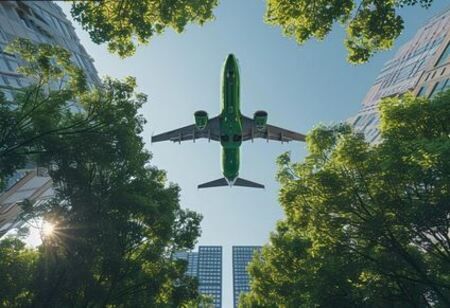
Airbus Predicts Massive Growth in Aircraft Fleet, India's Tourism Market


The global fleet of commercial aircraft is expected to more than quadruple to around 50,000 aircraft by 2044, according to a bold prediction made by Airbus SE on the future of aviation.
Rising middle-class countries like India, where air travel is becoming more and more popular, are expected to drive this explosive growth.
It is anticipated that the travel and tourism sector will be significantly impacted by the increase in aircraft availability, opening up new business and travel options.
It is impossible to overestimate India's significance in the world aviation sector. The nation's expanding middle class is driving the country's domestic aviation market, which is currently the third largest in the globe, to become the fastest-growing in the ensuing decades. It is anticipated that demand for both local and international flights would increase significantly as more people become able to afford to travel by air.
To accommodate this demand, major aircraft orders have already been placed by airlines such as IndiGo and Air India.
While IndiGo boasts an impressive order book of nearly 900 Airbus aircraft, including 60 A350 widebody jets, Air India has placed 570 orders with Airbus and Boeing since 2023.
Access to both new and existing domestic and international destinations will be improved as more aircraft join the market, increasing the total capacity.
Global passenger traffic is expected to expand by 3.6% year, according to Airbus, a trend that will be significantly impacted by more aircraft available. The global tourism and travel business will be significantly impacted by the growth of air travel in areas like Southeast Asia, the Middle East, and India.
Travelers will benefit from additional alternatives, better pricing, and easier access to neglected or previously unexplored destinations thanks to the increase in flights. More connectivity will be especially advantageous to travelers going to places like India, which will promote the growth of the travel industry. Local economies will be impacted by the increased population migration, which will boost demand for lodging, dining, and retail establishments as well as international tourism earnings.
However, the strain on airports and tourism infrastructure increases in tandem with demand. To keep up with the surge of tourists and preserve the caliber of travel services, governments and organizations involved in the travel industry will need to make significant investments.
Airlines will encounter several obstacles when expanding their operations, even with the optimism around the growth of the aircraft fleet. The timely delivery of new aircraft is still impacted by the ongoing supply chain disruptions that started during the COVID-19 pandemic Lack of engines and other vital equipment could impede the fleet's growth and make it more difficult for airlines to launch new routes or increase existing offerings.
Airlines will have to deal with mounting demand to become more sustainable in addition to manufacturing delays. Travelers are calling for more environmentally friendly travel options as concerns about climate change grow. Airlines must keep implementing more environmentally friendly and fuel-efficient planes in order to satisfy these expectations. Models like the Boeing 737 and Airbus A320neo are essential components of airlines' sustainability plans because they are made to use less fuel and emit fewer carbon emissions.
Over the next 20 years, the world's aircraft fleet is expected to rise significantly, mostly due to the quick expansion of emerging economies like India. The travel and tourism sector will change as a result of this expansion, giving tourists more choices and lower prices while also generating substantial economic prospects in a number of localities.
Also Read: Homegrown Ice Cream Brands that Can Cool You Off the Sweltering Heat
To preserve this development trajectory, the aviation sector will need to innovate and adjust to obstacles including supply chain interruptions and sustainability issues. Global air transport appears to have a very bright future with the correct investments and plans.